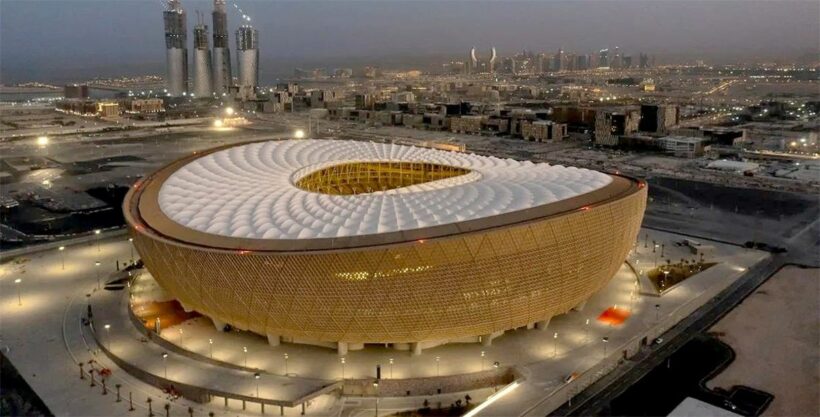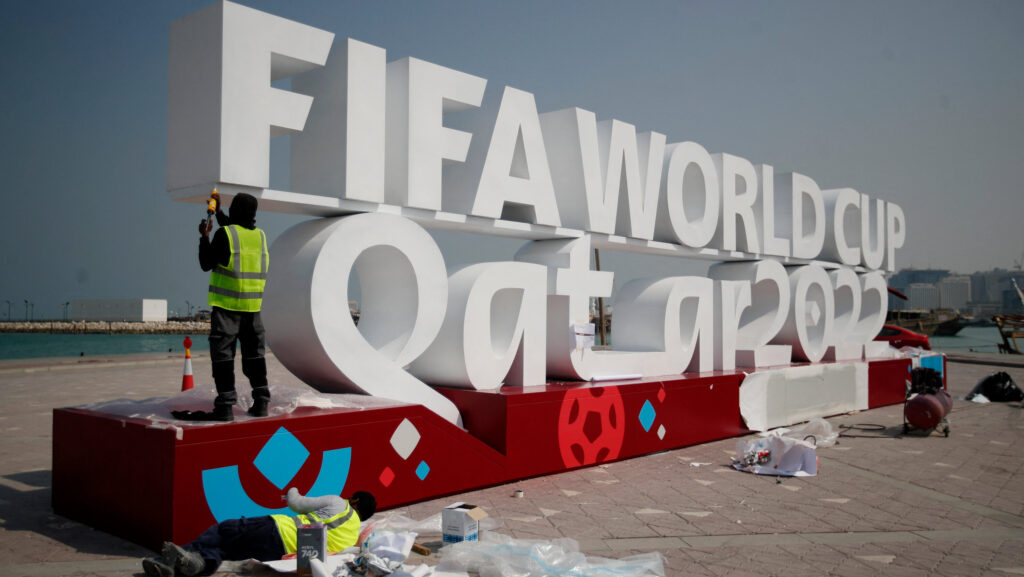A World Cup Stained with Blood and Bribery
SPORTS, 21 Nov 2022
Aram Aharonian | Pressenza - TRANSCEND Media Service
Qatar is a Soccer World Cup tainted by blood and corruption. The spread of these facts preoccupies the leadership of the International Federation of Association Football (FIFA) which, less than 20 days before the start of the tournament, asked the teams participating in the tournament to focus on soccer and not be part of “sermons” on morality, dragging soccer “into ideological or political battles that exist”.

Lusail Stadium, where the 2022 World Cup final will be played, Qatar.
(Image by Matias Giraudi, Wikimedia Commons)
14 Nov 2022 – The full letter that FIFA president Gianni Infantino and general secretary Fatma Samoura sent to the federations participating in the World Cup states: “Please, let’s concentrate on football now! Obviously, it does not cite the 6,500 workers killed in the construction of the stadiums or the bribes received by world football leaders to vote for Qatar as host.
Nor does it address the request by England and Wales, and six other European nations, for their captains to wear multi-coloured “One Love” armbands at the World Cup, which are a response to concerns about Qatar’s anti-LGBTQ+ laws. Both nations have already said they would defy any FIFA sanctions. And gone is Diego Mardona, who would surely protest against so much abuse and exploitation.
In recent days, the war in Ukraine has led to unprecedented resolutions and requests. In addition to the exclusion of Russia, which has already been carried out, there is now a request from Ukraine for Iran to be eliminated and for them to take its place. The reason? That Iran supplies Russia with drones used to attack its population. The request was made by the president of a Ukrainian club. In the qualifiers, Ukraine had just been defeated by the Iranian team.
And Latin America?
As planned, six Latin American teams will take part in Qatar2022: three of them are already world champions (Uruguay, Brazil, Argentina). Argentina’s participation is the 18th, with superstar Lionel Messi as the main attraction, knowing that his best results were the championships obtained in 1978 and 1986.
Brazil is participating for the 21st time and is the top World Cup winner, having won the 1958, 1962, 1970, 1994 and 2002 World Cups. It is fielding a team of superstars, including Neymar, Bolsonaro’s friend criticised by Lula for trying to evade tax obligations.
Uruguay is participating for the 14th time, after winning the 1930 and 1950 World Cups, with a team full of legends and new talent.
Ecuador is making its fourth appearance and its most notable result came at Germany 2006, when it reached the Round of 16. Costa Rica is the sixth time that they will play in the Cup, highlighting their participation in Brazil 2014, where they reached the quarter-finals. Meanwhile, Mexico is the sixteenth time they have taken part in the World Cup: they reached the quarter-finals in 1970 and 1986 in tournaments played in their country. Nothing has been said about the human rights situation in Qatar.
Buried under the stadiums
There is a great divide in the Muslim world: Sunni and Shia, today particularly evident in the current tensions between Saudi Arabia and Iran. Both share the same teachings of the Koran, but to the Western world Sunnis are good and Shiites are bad, even though they follow the same religious rules.
The young woman Mahsa Amini, who had gone to visit her family, was arrested on Tuesday 13 September outside a Tehran metro station by Iranian Islamic religious police, accused of breaking the law requiring women to cover their hair with a headscarf and their arms and legs with loose-fitting clothing. The young woman died days afterwards in a Tehran hospital, after spending three days in a coma. And the information was reported by all the mainstream media, sparking waves of protests.
But the death of at least 6,500 workers from Bangladesh, India, Nepal and the Philippines, who died from the extreme heat and the harsh conditions of labour exploitation to which they were subjected in the construction of the stadiums for the World Cup in Qatar, was concealed by the Qatari autocracy, the money of the six big transnational sponsors of the “sporting” event, the Western hegemonic press and, obviously, the accomplices of the massacre, FIFA…
“Deaths of natural causes” (without an autopsy), Qatar said, FIFA repeated and the hegemonic media publicised. In Qatar the word democracy is a bad joke. There the word is monopolised (like everything else) by the Al Thani royal family. And Sheikh Tamim Bin Hamad Al Thani, 42 years old and “only” three wives (at the same time) … for the time being.
Wealth? Some 350 billion dollars. Petrodollars have been used to build lavish buildings in the desert, buy football clubs – like Lionel Messi, Neymar and Mbappé’s Paris Saint Germian, among others -, silence the hegemonic press, and bribe anyone who opposes them.
Sunni, Shia, oil and the EU
The division of Muslims is not new, dating back to 632 and the death of the Prophet Muhammad, which led to a struggle for the right to lead Muslims. Even today, Sunnis and Shiites maintain important differences in doctrine, ritual, law, theology and organisation and compete for influence, especially in West Asia.
Their respective leaders are also used to competing for influence. From Syria to Lebanon to Iraq to Pakistan, many recent conflicts – some of them sponsored and financed by the West – have exacerbated this division, breaking up entire communities. Sunnis are the majority of Muslims – between 86 and 90 per cent – and see themselves as the most traditional and orthodox branch of Islam.
In fact, the name Sunni comes from the expression “Ahl al-Sunna”: the people of tradition, referring to practices derived from the actions of the Prophet Muhammad and his kin. Sunni religious teachers and leaders have historically been controlled by the state, which is largely controlled by undemocratic monarchies.
Shiites currently number an estimated 120-170 million adherents, roughly a tenth of all Muslims. They are in the majority in Iran, Iraq, Bahrain, Azerbaijan and possibly Yemen. There are significant Shi’ite communities in Afghanistan, India, Kuwait, Lebanon, Pakistan, Qatar, Syria, Turkey, Saudi Arabia and the United Arab Emirates.
The 1979 Iranian revolution, meanwhile, launched a radical Islamist Shia agenda that challenged conservative Sunni governments, particularly in the Persian Gulf.
The US replaced the colonialist UK as the main sponsor and security financier of the Persian Gulf states in the 1960s and 1970s, working to ensure a stable flow of Gulf oil.
Qatar is a small peninsula within a larger one called the Arabian Peninsula. The Arabic word for ‘peninsula’ is Al Jazeera, meaning ‘almost an island’. It shares a common past with the other small Arab monarchies – Kuwait, Bahrain, the Emirates, Oman – of first Ottoman and then British rule.
There was a time when the Persians ruled the country. But in 1968, as the British withdrew from some of their colonies, the Qataris joined the United Arab Emirates federation, a love affair that lasted just three years, to become an independent state under the leadership of the Al Thani family.
In the following decade, Khalifa bin Hamad Al Thani, grandfather of the current emir, nationalised the oil industry – leaving it under his control – the engine of the entire economy. The next thing to independence was to play football to prove it, recruiting players and coaches from all over the world. In June 1995, while Emir Khalifa was on holiday in Switzerland, his son staged a bloodless coup d’état and established himself as the new emir, who in 1996 launched Al Jazeera, the first Arabic-language satellite network.
Since 1992, Qatar has established intimate military ties with the United States, and is now home to the forward headquarters of the US Central Command and the Combined Air Operations Centre. The base at Al Udeid, the largest US base in the Middle East, has the capacity to accommodate more than 100 aircraft and more than 10,000 troops.
Al Udeid plays a key role in US military operations in the region, including the fight against the self-styled Islamic State (IS).
Bribes, lots of them
Since its designation as host of the 2022 World Cup, Qatar has been the source of much controversy. Allegations of bribery to get the Persian Gulf country chosen compromised a dozen leaders. It was accused of paying FIFA officials $3.7 million in bribes to secure their backing, but was acquitted after a two-year investigation.
Then-FIFA president Sepp Blatter supported Qatar’s bid at the time, but has since accepted the possibility that he made the wrong decision. Moral: Blatter is currently facing trial in Switzerland on charges of fraud, embezzlement and other corruption charges.
Investigations indicate that he paid $1 million to delegates from the Central American Confederation (Concacaf), $1.5 million to delegates from the South American Confederation (Conmebol), and millions from Asia and Europe. The French press reported that former French superstar Michel Platini was paid 7.5 million dollars. And Argentine super-captain Julio Grondona, the puppet master of South American football, pocketed $10 million for saying yes to Qatar 2022 before he died in 2014.
Several cities in France rose up in protest against the event for a number of reasons, most outrageously the numbers of people who died to create the stadiums. Controversies revolve around the ecological impact of the tournament, the rights of migrant workers, irregularities in stadium construction and cultural aspects that infringe on human rights.
Qatar touted the World Cup as the first carbon-free event in its history, talking extensively about the solar-powered air conditioning that will cool the eight stadiums, its electric metro system, and so on. In May, European NGO Carbon Market Watch (CMW) contradicted the Qatari claims, accusing it of applying “creative accounting” to achieve its targets.
The Qatari government claimed to have hired 30,000 foreign workers solely to build the eight stadiums for the event. Most of the employees were from Bangladesh, India, Nepal and the Philippines. According to various humanitarian organisations, at least 6,500 workers died from the extreme heat and harsh conditions they were subjected to.
Bikinis, alcohol and homosexuality banned
Obviously, Qatar will not want to present itself to the world as a state that is opening its doors to the West for it to make a World Cup and then end up with people imprisoned or with certain rights violated. They’re going to have to be more flexible or…
At the end of 2021, Nasser Al-Khater, president of the 2022 World Cup organising committee reiterated that “homosexuality is not allowed” but that LGTBIQ+ fans will have the right to travel, although he clarified that “public displays of affection are frowned upon and this applies to everyone”.
FIFA president Gianni Infantino explained in September that the Qatari authorities had given him assurances that any eventual inconvenience would be handled in accordance with international human rights standards. No one understood what he meant, or perhaps it was a response to the Australian team’s statement.
The Australians called on Qatar to implement human rights reforms, including decriminalisation of same-sex relationships, ahead of the World Cup.
In a collective video, which was posted on the team’s official social media channels, several of the players raised concerns about the treatment of migrant workers, following reports of the deaths of thousands of migrant workers who worked on the construction of infrastructure for the Qatar 2022 World Cup.
On 3 November, just days before the tournament, Qatar announced that Qatari health services will not ask women needing medical treatment during the 2022 World Cup whether they are married or not, in a country where sexual relations outside marriage are forbidden. “People will not be asked whether they are married or not, their sex, their nationality or their religion,” said Youssef Al Maslamani, spokesman in charge of health issues for the organising committee.
A breath of humanity, because under Qatari law, sexual relations outside marriage are punishable by up to seven years in prison.
________________________________________________-
 Aram Aharonian, M.A. is a Uruguayan journalist and teacher, founder of TeleSUR, director of the Observatory on Communication and Democracy, and president of the Foundation for Latin American Integration.
Aram Aharonian, M.A. is a Uruguayan journalist and teacher, founder of TeleSUR, director of the Observatory on Communication and Democracy, and president of the Foundation for Latin American Integration.
This post is also available in Spanish
Go to Original – pressenza.com
Tags: Corruption, FIFA, Inequality, Qatar, Slave labor, Soccer World Cup, Sports
DISCLAIMER: The statements, views and opinions expressed in pieces republished here are solely those of the authors and do not necessarily represent those of TMS. In accordance with title 17 U.S.C. section 107, this material is distributed without profit to those who have expressed a prior interest in receiving the included information for research and educational purposes. TMS has no affiliation whatsoever with the originator of this article nor is TMS endorsed or sponsored by the originator. “GO TO ORIGINAL” links are provided as a convenience to our readers and allow for verification of authenticity. However, as originating pages are often updated by their originating host sites, the versions posted may not match the versions our readers view when clicking the “GO TO ORIGINAL” links. This site contains copyrighted material the use of which has not always been specifically authorized by the copyright owner. We are making such material available in our efforts to advance understanding of environmental, political, human rights, economic, democracy, scientific, and social justice issues, etc. We believe this constitutes a ‘fair use’ of any such copyrighted material as provided for in section 107 of the US Copyright Law. In accordance with Title 17 U.S.C. Section 107, the material on this site is distributed without profit to those who have expressed a prior interest in receiving the included information for research and educational purposes. For more information go to: http://www.law.cornell.edu/uscode/17/107.shtml. If you wish to use copyrighted material from this site for purposes of your own that go beyond ‘fair use’, you must obtain permission from the copyright owner.
